 1
1 1
1
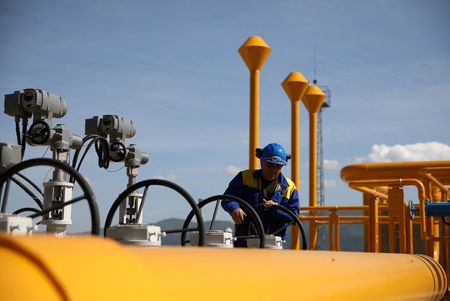
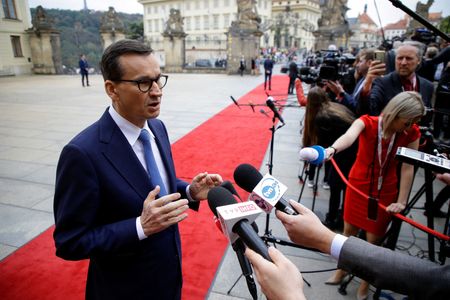
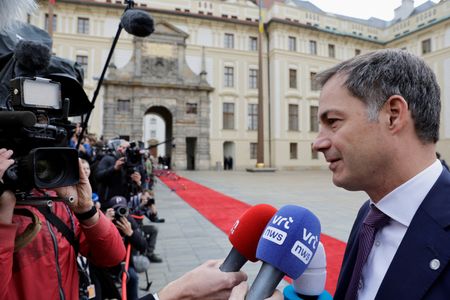
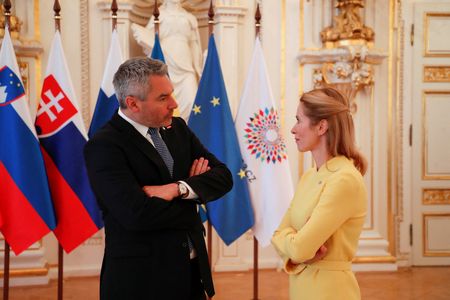
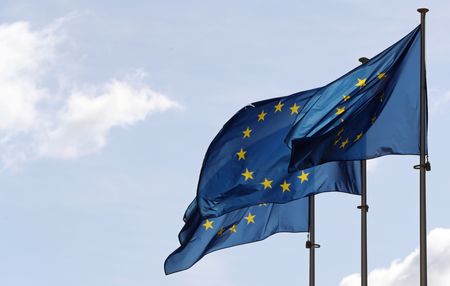
By Michel Rose, Andreas Rinke and Sabine Siebold
PRAGUE (Reuters) – European Union leaders on Friday agreed to give more financial and military aid to Ukraine, but a day of talks in Prague’s ornate royal castle seemed to bring them no closer to deciding on whether or how to cap gas prices.
Most of the EU’s 27 countries want a cap on gas prices, but disagree on details, with options including a cap on all gas, a “dynamic corridor”, a price ceiling on gas used for power generation specifically or on Russian gas only.
The EU has been discussing the matter for weeks, so far without result, although the 27 have agreed other joint steps to help them weather an acute energy crunch as runaway prices threaten to bring about a recession in the bloc.
“Everyone agrees we need to lower power prices but there is no agreement what instruments to use to that end exactly,” Poland’s Prime Minister Mateusz Morawiecki told reporters as talks among the 27 national EU leaders went into late afternoon.
Ireland’s premier, Micheal Martin, also said that “lots of work needed to be done” still before an agreement emerges.
Martin said the bloc’s executive, the European Commission, was expected to present for the next meeting of EU leaders on Oct. 20-21 a broader package of short-term measures to lower prices and longer-term steps to redesign the gas market.
The cap is one of a range of proposals and initiatives by European states to cope with plummeting gas supplies from Russia, which once supplied 40% of Europe’s needs, and rocketing prices. They have eased off this year’s peaks but remain more than 200% higher than at the start of September 2021.
Germany, Denmark and the Netherlands oppose a cap, worried that it would make it difficult to buy the gas their economies need and dampen any incentive to reduce consumption.
As differences between EU countries over ways to alleviate the energy crisis played out, Warsaw also lashed out at Berlin over the latter’s plan to spend up to 200 billion euros ($196 billion) in subsidies to shield German consumers and businesses from soaring energy costs.
“The richest country, the most powerful EU country is trying to use this crisis to gain a competitive advantage for their businesses on the single market. This is not fair, this is not how the single market should work,” Morawiecki said.
UKRAINE
But the bloc showed unity in vowing continued support for Ukraine, said an EU official who was briefed on the talks behind closed doors. The leaders were “committed to continue military and financial support” to Kyiv, said the person, without providing details.
That came after Ukrainian President Volodymyr Zelenskiy addressed the EU leaders through a video link.
“Russia brought war to our land… And only thanks to the fact that the Ukrainian people stopped this invasion by Russia, Russia cannot yet bring the same war to other parts of Europe, in particular, the Baltic countries, Poland, and Moldova,” Zelenskiy said, according to a transcript on his website.
He called for more air systems to defend Ukrainian energy infrastructure from Russian strikes, for international pressure to remove Russian troops from the Zaporizhzhia nuclear power plant in occupied Ukraine, and for funds to rebuild Ukraine.
The bloc’s top diplomat, Josep Borrell, said earlier in the day he wanted the bloc to earmark more money for military support for Ukraine, including for training, and that specific proposals on that could be approved later this month.
(Reporting by Jan Strupczewski, Kate Abnett, Jason Hovet, Alan Charlish, Sabine Siebold, Michel Rose, Michael Kahn, Pawel Florkiewicz, Marine Strauss, Sudip Kar-Gupta, Charlotte van Campenhout, Bart Meijer, Jan Lopatka, Robert Muller, Sabine Siebold; Writing by Gabriela Baczynska and Anthony Deutsch; Editing by Hugh Lawson)